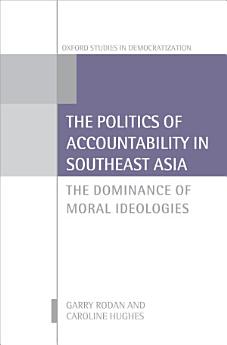The Politics of Accountability in Southeast Asia: The Dominance of Moral Ideologies
Feb 2014 · OUP Oxford
Ebook
224
Pages
family_home
Eligible
info
reportRatings and reviews aren’t verified Learn More
About this ebook
Calls by political leaders, social activists, and international policy and aid actors for accountability reforms to improve governance have never been more widespread. For some analysts, the unprecedented scale of these pressures reflects the functional imperatives and power of liberal and democratic institutions accompanying greater global economic integration. This book offers a different perspective, investigating the crucial role of contrasting ideologies informing accountability movements and mediating reform directions in Southeast Asia. It argues that the most influential ideologies are not those promoting the political authority of democratic sovereign people or of liberalism's freely contracting individuals. Instead, in both post-authoritarian and authoritarian regimes, it is ideologies advancing the political authority of moral guardians interpreting or ordaining correct modes of behaviour for public officials. Elites exploit such ideologies to deflect and contain pressures for democratic and liberal reforms to governance institutions. The book's case studies include human rights, political decentralization, anticorruption, and social accountability reform movements in Cambodia, Indonesia, Malaysia, the Philippines, Singapore, Thailand, and Vietnam. These studies highlight how effective propagation of moral ideologies is boosted by the presence of powerful organizations, notably religious bodies, political parties, and broadcast media. Meanwhile, civil society organizations of comparable clout advancing liberalism or democracy are lacking. The theoretical framework of the book has wide applicability. In other regions, with contrasting histories and political economies, the nature and extent of organizations and social actors shaping accountability politics will differ, but the importance of these factors to which ideologies prevail to shape reform directions will not. Oxford Studies in Democratization is a series for scholars and students of comparative politics and related disciplines. Volumes concentrate on the comparative study of the democratization process that accompanied the decline and termination of the cold war. The geographical focus of the series is primarily Latin America, the Caribbean, Southern and Eastern Europe, and relevant experiences in Africa and Asia. The series editor is Laurence Whitehead, Official Fellow, Nuffield College, University of Oxford.
About the author
Garry Rodan is Professor of Politics and International Studies at the Asia Research Centre, School of Management and Governance, Murdoch University, Australia. He is also a Fellow of the Academy of Social Sciences in Australia. He is the author of Transparency and Authoritarian Rule in Southeast Asia (RoutledgeCurzon 2004) and The Political Economy of Singapore's Industrialization (Macmillan, 1989). His edited and co-edited books include Neoliberalism and Conflict in Asia After 9/11 (Routledge 2005), The Political Economy of Southeast Asia (OUP, 1997, 2001, 2006), Political Oppositions in Industrializing Asia (Routledge 1996), Singapore Changes Guard (Longman 1993) and Southeast Asia in the 1990s: Authoritarianism, Capitalism and Democracy (Allen & Unwin 1993). Caroline Hughes is Professor Conflict Resolution and Peace in the Department of Peace Studies at the University of Bradford in the UK. She was previously Director of the Asia Research Centre at Murdoch University in Australia. Her research has focused upon the political economy of regime change and post-conflict statebuilding, in Cambodia and East Timor in particular. She is the author of Dependent Communities: Aid and Politics in Cambodia and East Timor (Cornell SEAP, 2009) and The Political Economy of Cambodia's Transition 1991-2001 (Routledge, 2003).
Rate this ebook
Tell us what you think.
Reading information
Smartphones and tablets
Install the Google Play Books app for Android and iPad/iPhone. It syncs automatically with your account and allows you to read online or offline wherever you are.
Laptops and computers
You can listen to audiobooks purchased on Google Play using your computer's web browser.
eReaders and other devices
To read on e-ink devices like Kobo eReaders, you'll need to download a file and transfer it to your device. Follow the detailed Help Center instructions to transfer the files to supported eReaders.





